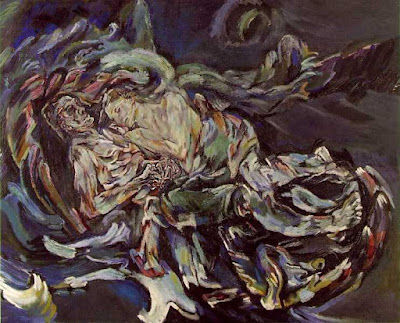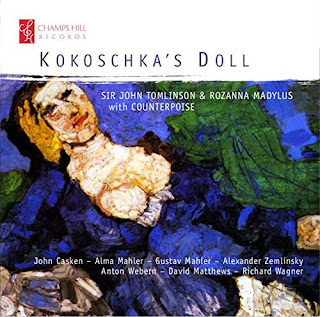Kokoschka's Doll - Alma Mahler, Alexander Zemlinsky, Gustav Mahler, Anton Webern, David Matthews, Richard Wagner, Richard Wagner/Franz Liszt, John Casken; John Tomlinson, Rozanna Madylus, Counterpoise; Champs Hill Records
Reviewed by Robert Hugill on 11 February 2020 Star rating: (★★★½)
The tempestuous relationship between Alma Mahler and Oscar Kokoschka forms the basis for this fascinating disc which mvoes from the music of Alma and Gustav Mahler to the contemporary melodrama by John Casken
Alma Mahler had a life which spanned a fascinating slice of 20th century artistic life, friends with Gustav Klimt, she had affairs with Alexander von Zemlinsky and Oscar Kokoschka, married Gustav Mahler, Walter Gropius and Franz Werfel, and her daughter Manon Gropius had Alban Berg's Violin Concerto written in memory of her. A talented composer she was forced to stop when she married Mahler and though she briefly re-started, her compositions peter out.
It is Alma Mahler's relationship with the artist Oscar Kokoschka which is the subject of this new disc, Kokoschka's Doll on Champs Hill Records. The centrepiece of the disc is John Casken's new melodrama Kokoschka's Doll and this is prefixed by a selection of music by Alma Mahler, Alexander Zemlinsky, Gustav Mahler, Anton Webern, David Matthews, and Richard Wagner which introduces Alma Mahler and her life, all performed by Sir John Tomlinson (bass), Rozanna Madylus (mezzo-soprano), and Counterpoise (Fenella Humphreys - violin, Deborah Calland - trumpet, Kyle Horch - saxophone/clarinet, Iain Farrington - piano).
Reviewed by Robert Hugill on 11 February 2020 Star rating: (★★★½)
The tempestuous relationship between Alma Mahler and Oscar Kokoschka forms the basis for this fascinating disc which mvoes from the music of Alma and Gustav Mahler to the contemporary melodrama by John Casken
Alma Mahler had a life which spanned a fascinating slice of 20th century artistic life, friends with Gustav Klimt, she had affairs with Alexander von Zemlinsky and Oscar Kokoschka, married Gustav Mahler, Walter Gropius and Franz Werfel, and her daughter Manon Gropius had Alban Berg's Violin Concerto written in memory of her. A talented composer she was forced to stop when she married Mahler and though she briefly re-started, her compositions peter out.
It is Alma Mahler's relationship with the artist Oscar Kokoschka which is the subject of this new disc, Kokoschka's Doll on Champs Hill Records. The centrepiece of the disc is John Casken's new melodrama Kokoschka's Doll and this is prefixed by a selection of music by Alma Mahler, Alexander Zemlinsky, Gustav Mahler, Anton Webern, David Matthews, and Richard Wagner which introduces Alma Mahler and her life, all performed by Sir John Tomlinson (bass), Rozanna Madylus (mezzo-soprano), and Counterpoise (Fenella Humphreys - violin, Deborah Calland - trumpet, Kyle Horch - saxophone/clarinet, Iain Farrington - piano).
 |
| Alma Mahler painted by Oscar Kokoschka in 1912 |
As the melodrama gives Alma no voice, we hear only Kokoschka's letters to her, the first part of the programme is designed to introduce Alma and give her more of a presence. So we start with a group of Alma's songs, sung by Rozanna Madylus. The first three are given in chamber arrangements by David and Colin Matthews and it is fascinating the effect that this has as the textures bring out the cabaret element in Alma's writing. There is some terrific instrumental playing here and lovely interactions between mezzo-soprano Rozanna Madylus and the instrumentalists.
Alma's final song, Einsamer Gang is given in its original version with just piano, a quiet, interior piece with interesting undercurrents. The song was written just after Alma started lessons with Zemlinsky and has only recently been discovered (Madylus and Farrington premiered the song in 2018 in the stage version of this disc). Alma's songs are an intriguing might-have-been, and we can hear all sorts of influences here including Richard Strauss. Quite where her talent might have taken her, if she had been encouraged, is anyone's guess.
Zemlinsky's song Selige Stunde also dates from the period of the composition lessons, again it is intimate and again we hear the distant echo of the Berlin cabaret.
The 'Adagietto' from Mahler's Symphony No. 5 was originally written as a love-song for Alma, and here we hear an extract in a lovely performance by violinist Fenella Humphreys and pianist Iain Farrington (in Farrington's own arrangement), scaled down and intimate yet full of passion. Two of Mahler's own songs follow, both written for Alma, Liebst du um Schonheit and Wo die schonene Trompeten blasen, in chamber versions by David Matthews. The first touching and intimate, the second elegiac with lovely interactions between voice and instruments, and in both a striking new way of hearing the songs.
 |
| The Bride of the Wind or The Tempest, a self-portrait by Oscar Kokoschka expressing his unrequited love for Alma Mahler, 1914 |
It was after Alma had sung and played Isolde's Liebestod for Kokoschka that he fell for her, so this section ends with Wagner's song Traume, explicitly labelled a sketch for Tristan und Isolde, in a chamber version by David Matthews, and Liszt's piano solo version of Isolde's Liebestod. Rozanna Madylus makes the song intimate and delicate, whilst Iain Farrington plays the Liszt with understated bravura.
Whilst Casken's piece is labelled a melodrama in fact it is more of a theatre piece as the vocal part uses a mixture of melodrama, sprech-stimme and sung, with a series of sung letters to Alma. Casken's music seems to make the music we have been hearing in the first half of the disc its starting point, and he weaves in the Wagner which inspired Kokoschka so much.
Tomlinson gives a riveting performance, moving fluidly between spoken, half-spoken and sung, making each word count. You certainly do not need to follow the printed text, everything is clear and every syllable counts. This is a highly expressive performance and one that compels, and I think it would do so in live performance too. But, frankly, I am not quite sure how much Casken's music adds. It is highly effective and scene-sets beautifully but later in the work as we first realise quite how obsessive Kokoschka is, and then when he starts talking about the idea of the doll and actually putting it into practice I did wonder whether musically we could not have gone somewhere a little more disturbing.
Both Alma Mahler and Oscar Kokoschka are both fascinating figures (Kokoschka's plays would become operas by Hindemith and Krenek), and this disc explores such an intriguing and disturbing episode. Tomlinson, Madylus and Counterpoise all give terrific performances, the disc was made after a sequence of live performances [see the review in The Guardian] and it really shows in that each piece is a vivid series of chamber interactions.
Alma Mahler (1879-1974), arr. David Matthews - Laue Sommernacht [2.13]
Alma Mahler, arr. David Matthews - Licht in der Nacht [3.36]
Alma Mahler, arr. Colin & David Matthews - Erntelied [4.47]
Alma Mahler - Einsamer Gang [3.13]
Alexander Zemslinsky (1871-1942) - Selige Stunde [1.47]
Gustav Mahler (1860-1911), arr. Iain Farrington - Adagietto extract (Symphony No. 5) [3:57]
Gustav Mahler, arr. David Matthews - Liebst du um Schonheit [2:16]
Gustav Mahler, arr. David Matthews - Wo die schonen Trompeten blasen [7:17]
Anton Webern (1883-1945) - Trio movement [1:02]
David Matthews (born 1943) - Transformation [1:20]
Richard Wagner (1813-1883) - Traume [4:31]
Richard Wagner/Franz Liszt - Isolde's Liebestod [7:14]
John Casken (born 1949) - Kokoschka's Doll [38.29]
Sir John Tomlinson (bass)
Rozanna Madylus (mezzo-soprano)
Counterpoise (Fenella Humphreys - violin, Deborah Calland - trumpet, Kyle Horch - saxophone/clarinet, Iain Farrington - piano)
Recorded 22-22 May 2018, 17 January 2019, Music Room, Champs Hill, West Sussex
CHAMPS HILL CHRCD150 1CD [81.54]
Elsewhere on this blog
- Whither Must I Wander? A young American duo bring poetry & imagination to a voyage around RVW's Songs of Travel (★★★½) - CD review
- Riveting & magnificent: Yan Pascal Tortelier & Iceland Symphony Orchestra's 70th birthday tour reaches London with Yeol Eun Son in Ravel and Anna Thorvaldsdottir's Aeriality (★★★½) - concert review
- Bringing the music to vibrant life: Owen Rees & Contrapunctus explore the enthusiasm for Josquin's music in 16th century Spain - (★★★★) CD review
- Les vêpres Siciliennes: Verdi's French Grand Opera makes a rare appearance in Welsh National Opera's striking new production - opera review
- For a piece to suit the requirements of a particular occasion is the ultimate praise: composer Bernard Hughes chats about his approach to composing & his new disc of music for narrator & orchestra, Not Now, Bernard! - interview
- Opera to Die For: the National Opera Studio in opera scenes from Mozart to Britten through Gounod, Puccini, Janacek & Ullmann at Sadler's Wells - opera review
- Monteverdi to Italian contemporary music by way of Cage, Berio & Glass: Highlands and Sea from Laura Catrani and Claudio Astronio (★★★½) - CD review
- Arianna: Kate Lindsey & Arcangelo bring Ariadne vividly to life in cantatas by Scarlatti, Handel & Haydn - (★★★★) CD review
- An evening with Rosina Storchio: Ermonela Jaho's Wigmore Hall debut celebrates Opera Rara's 50th anniversary (★★★★) - concert review
- Music conceived of through restriction, which paradoxically gives the composer freedom: I chat to composer & Royal Academy of Music lecturer Alex Hills - Interview
- A touch of heaven: The Divine Muse, Mary Bevan & Joseph Middleton in Wolf, Schubert & Haydn (★★★★) - concert review
- A welcome chance to hear the Orchestra National de Lille under its music director Alexandre Bloch in London, in Ravel, Debussy and Beethoven (★★★★) - concert review
- Home




.jpg)







No comments:
Post a Comment